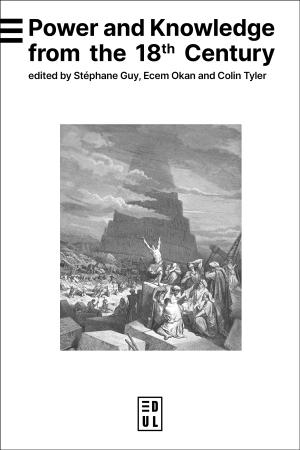Power and Knowledge from the 18th Century
Attestés depuis les débuts de la démocratie grecque et la conception platonicienne du roi philosophe, les liens qu’entretiennent pouvoir et savoir se sont récemment rappelés à notre mémoire avec la montée des populismes ou le développement de l’intelligence artificielle. Cet ouvrage collectif explore les enjeux de tels liens du 18e siècle à nos jours. Il examine dans quelle mesure la connaissance permet d’établir, de légitimer ou de discréditer des formes et des figures du pouvoir politique, économique et intellectuel, et comment ces formes de pouvoir, à leur tour, façonnent et influencent la définition de savoir.
Comment le développement du savoir a-t-il conditionné les multiples formes de gouvernement que nous connaissons ? Comment la théorie ou la technique ont-elles contribué à établir la légitimité d’une idéologie ou d’un gouvernement ? Comment les gouvernants ont-ils mobilisé la connaissance afin de justifier ou de pérenniser une intervention éphémère, des pratiques à long terme ou un état de fait ? Des conceptions d’un ordre social établi sur le savoir du 18e siècle aux sociétés savantes nées aux 19e siècle et visant aujourd’hui encore à influencer les responsables politiques et l’opinion, cet ouvrage mobilise des méthodologies distinctes et complémentaires pour identifier des points de convergence et de divergence dans divers contextes et à différentes époques.

Ce travail est disponible sous licence Creative Commons Attribution - Pas d'Utilisation Commerciale - Pas de Modification 4.0 International, sauf mention contraire.
Comment citer
Sommaire
|
Information
|
|
|
Introduction. ‘Power’ and ‘Knowledge’: A Contextualised and Essentially-Contested Relationship
|
|
|
PART 1. POWER AND KNOWLEDGE DURING THE ENLIGHTENMENT
|
|
|
Chapter 1. The Power of Knowledge: Technocratic Models and Governmental Practices in the Viceroyalty of New Spain in the Eighteenth Century
|
|
|
Chapter 2. The Power Of ‘Useful Truths’: Political Economy and the Reshaping of Political Debate in Enlightenment Venice (1765–97)
|
|
|
Chapter 3. The State, the Teacher, and the Children’s Author: The Politics of the Circulation of Knowledge in William Godwin’s Educational Thought and Practice
|
|
|
Chapter 4. Citizenship as a ‘Technology of Government’ in Revolutionary France, 1789–92
|
|
|
PART 2. SCIENCE, CULTURE AND POLITICS IN THE NINETEENTH CENTURY
|
|
|
Chapter 5. The Figure of the Expert in Britain’s Afghan Policy, 1830–50
|
|
|
Chapter 6. Lord Acton and the Dogma of Papal Infallibility: The ‘End of History’?
|
|
|
Chapter 7. The League of Learning Project: Henry Jones’s Reflections on the Relationship Between Knowledge, Power and State
|
|
|
Chapter 8. Curricular Innovation and the Politics of Culture at the Time of the Second Reform Act
|
|
|
Chapter 9. Whose Knowledge? Whose Power? Whose Democracy? Adult Education and the Changing Political Balance of Class Power in Britain (1870–1923)
|
|
|
Chapter 10. Gendered Knowledge Desperately Seeking Acknowledgement: The Case Study of The Consumer in Revolt, London, 1912, By Teresa Billington-Greig
|
|
|
PART 3. THE AGE OF NEOLIBERALISM FROM THE TWENTIETH-CENTURY ONWARDS
|
|
|
Chapter 11. Friedrich Hayek and Hannah Arendt: Two Forms of Opposition to The Myth of the Cave
|
|
|
Chapter 12. Thatcherism as Scepticism and Dogmatism
|
|
|
Chapter 13. Intellectual Histories of Neoliberalism and their Limits
|
|
|
Chapter 14. Rejecting the Anthropocene: The Diverse Epistemologies of Climate Paralysis
|
|
|
Chapter 15. The Interplay Between Public Opinion and the Positions of Political Elites: The Case of the Conservative and Labour Parties and Brexit
|
|
|
Chapter 16. From the Street to the Screen: Countering Power on Campuses and through Computers in the San Francisco Bay Area
|
|
|
FINAL PAGES
|
|
|
Contributors
|




